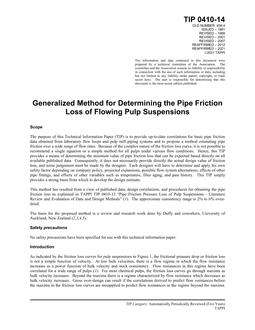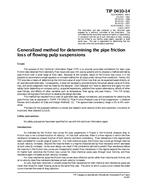
TAPPI TIP 0410-14
- Comments Off on TAPPI TIP 0410-14
- TAPPI
The purpose of this Technical Information Paper (TIP) is to provide up-to-date correlations for basic pipe friction data obtained from laboratory flow loops and pulp mill piping systems and to propose a method estimating pipe friction over a wide range of flow rates. Because of the complex nature of the friction loss curve, it is not possible to recommend a single equation or a simple method for all pulps under various flow conditions. Hence, this TIP provides a means of determining the minimum value of pipe friction loss that can be expected based directly on all available published data. Consequently, it does not necessarily provide directly the actual design value of friction loss, and some judgement must be made by the designer. Each designer will have to determine and apply his own safety factor depending on company policy, projected expansions, possible flow system alternations, effects of other pipe fittings, and effects of other variables such as temperature, fiber aging, and past history. This TIP simply provides a strong basis from which to develop the design estimate.
This method has resulted from a view of published data, design correlations, and procedures for obtaining the pipe friction loss as explained in TAPPI TIP 0410-12 Pipe Friction Pressure Loss of Pulp Suspensions – Literature Review and Evaluation of Data and Design Methods (1). The approximate consistency range is 2% to 6% oven-dried.
The basis for the proposed method is a review and research work done by Duffy and coworkers, University of Auckland, New Zealand (2,3,4,5).
Product Details
- Published:
- 2021
- Number of Pages:
- 6
- File Size:
- 1 file , 2.9 MB


